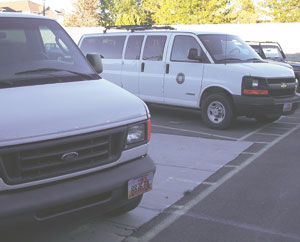CEU’s 15-passenger vans deemed safe despite recent tragedy

This archived article was written by: Cj Jelsma
Last week’s fatal 15-passanger van rollover that killed nine Utah State University students left several state colleges and universities worried about the vans employed in their own fleets.
The fatal accident was attributed to a tire blowout that occurred while the driver of the vehicle was going upwards of 100 mph while passing another vehicle. The blowout caused the van to rollover, ejecting all passengers inside the vehicle.
The vans are widely used by colleges across the nation but are also used by day-care centers, scout troops, churches and hotels.
A rash of accidents occurring with the vans has caused the National Highway Traffic Administration to issue a rare advisory warning that the 15-passanger vans have a much higher risk of rollovers when fully loaded. The advisory has been issued by the administration at least four times after accidents.
The College of Eastern Utah employs several vans similar to the one in the accident but the vans in the college’s fleet are newer and are said to be safer than the older versions.
CEU is currently leasing three 15-passenger vans, one 12-passenger van and two minivans from the state of Utah. The 15-passenger vans used by CEU are all 2004 models. The newer models have less problems than the older versions that were involved in most accidents in the past. The vans are required to maintain strict maintenance schedules from state mechanics on a regular basis to make sure that they are suitable to be driven.
The vans are used by students and faculty of the college on a daily basis.
The vehicles that are leased from the state are traded back in after reaching 90,000 miles. This ensures that the college keeps newer vehicles in use at all times.
To operate a CEU van, a driver must be 21 years old or older and have taken the safety class given by the school. Drivers are also required to watch a new safety video for the operation of the vans before being allowed to drive.
Since 1990, 1,358 people have been killed in 15-passanger van accidents nationwide. Hundreds have been injured in these accidents.
Safety experts say that the vans have higher centers of gravity and that the more passengers on board, the more prone to accidents and rollovers the vans are.
Operators of these vans are required to take a safety class to decrease the chance of a major accident occurring. The class teaches the van operators how to drive the vans properly and distribute weight within the van.
The driver of the USU van, Evan Parker, a USU instructor who died in the accident, was discovered not to have taken the safety course required by USU. Parker was exempt from taking the class because he had a commercial-driver license.
The largest problem with the passenger vans is that in most cases tires are not inflated to the proper weight. To limit the possibility of accidents with these vans, it is recommended that tire pressures be checked on a weekly basis.
While maintenance of the vehicles is important to the safety of the vans, buckling of seat belts cannot be overstated as an important safety precaution that increases the chance of a passenger’s survival during a major accident. 80 percent of people who have died in van rollovers from 1990 to 2003 have not been buckled up.




